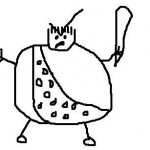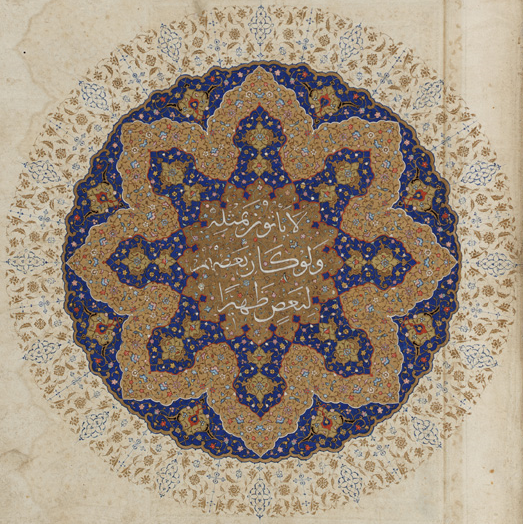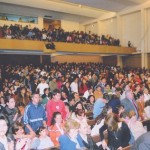This post is forthcoming on No Longer Quivering.

As followers of God’s final prophet and members of the elect Bride of Christ, we made a lot of promises in God’s name. We promised safety to a world we presumed was in its death throes, ready to face tribulation, destruction and ultimate renewal. We promised healing, hope and happiness to those who accepted God’s provided way of escape. We promised individuals that their broken families would be restored, that their financial problems would vanish when they tithed, that God’s will would give them purpose and the strength to deal with the wearying parade of everyday troubles. We promised Alissa that God would heal her daughter.
Alissa was a single mother of two young boys. She worked as a clerical assistant in a faceless grey office. It paid the bills, but not all of them. She had a husband, too, but not all of him. He brought home other women, parading them in front of her face. He took them out to places she would never see. He riled up the boys, then refused to parent them. He made them despise and curse her. He probably took her money, too, but I don’t know. I was a kid, and I wasn’t supposed to listen to these kinds of stories, even though my dad was doing the same thing.
Late in the 1990s, Alissa found out she was pregnant. A third baby for a man who hardly noticed the first two. But Alissa had dreams for this one: this little girl would charm her daddy’s heart, bring him back, make a real man out of him. And our church turned those dreams into promises. God would honor her faith and restore her marriage, since she had submitted to her husband despite all the trials and was ready to bear him a daughter. Just wait and see, we promised her, God has a special miracle for you. How glorious it will be when he reveals his power through you and your family!
Within weeks, Alissa learned that there was a problem with the baby. The child had a genetic abnormality: an extra chromosome, perhaps. She was expected to live only a matter of hours, if she wasn’t already stillborn. The doctors recommended abortion. They said it would spare Alissa the pain of saying goodbye to a daughter who would never hear her hello.
Everyone at church smiled knowingly at this point in Alissa’s story. Doctors loved to recommend abortion, especially unnecessary abortion. It made them money, after all. Alissa ought to ignore them. They were part of a culture of death and hated motherhood. Worse, they didn’t believe in the power of God to heal the sick! Not even cancer could stand before the prayers of God’s elect. Heads wagged along with the tongues. Those doctors might think they knew what they were doing, but they didn’t know our God. He could turn Alissa’s dreams into promises.
Alissa refused the abortion. She fought with the nurses and the doctors. She changed hospitals, signed forms, arguing with lawyers. As she told us her story, her face shone serene with the knowledge that God would raise up her baby as a shining light to condemn the unbelievers. At church, everyone praised her vociferously. “God bless you, sister! You’re standing on the word of God and He will not let you down! God is able to deliver your baby perfectly whole. When your husband sees that miracle, he’ll fall on his face and repent! How can he deny the power of almighty God?” We cheered for her, and she went home.
In due course, the baby was born. Sierra was her name, just like mine. We didn’t see the baby right away, because she had to stay in the hospital. She was born with holes in her heart. Nobody expected her to live, except our church. We were sure. I sat trembling as our pastor announced that we would soon see the power of God before our very eyes. That miracle baby, Sierra, would arise, walking and leaping and praising God. She would rebuke the world’s doctors and abortionists: If my mother hadn’t trusted God, she’d say, you would have killed me before I was born. Barely breathing, we waited to hear her baby cries condense into these words of faith. This was God’s promise.
The noise dampened as the baby grew. In and out of hospitals she went, gaining weight as her mother gained hope. So far, her testimony seemed secure. Whispers circulated in my church that this baby would be healed slowly but surely. God could work in an instant, but he also sometimes took years, especially when he needed to teach someone a lesson. We all imagined Alissa’s husband chafing under the Lord’s rebuke.
In the meantime, Alissa continued to fight the hospitals for the right to bring her daughter home. She signed forms, went to court, testified of her belief in the healing power of God in a room full of faithless lawyers. She demanded that she be allowed to take her child and raise her normally. God would reward her courage. He would not let the child die. The lawyers nervously assigned her a social worker and sent her on her way. We watched a parade of anxious nurses come with her to church every few weeks, struggling to keep Sierra comfortable through the hour-long sermons.
Alissa came to church sporadically. It was soon apparent that the child’s development had utterly stalled: she could not eat or drink on her own. No one knew whether she could see or hear, but the prospects were grim. She lacked motor control and control of her bowels. When Alissa wheeled her into the church foyer, we touched her arms and told ourselves that she could feel us and was comforted. But her head swung around wildly and she let out only a low, loud moaning sound, like a creature in terrible pain. I tried to smile at the baby who couldn’t look at me, the baby who shared my name. I smiled anxiously at Alissa, aching with the unspoken knowledge that this baby hadn’t brought her husband back, either. She came to church with her two wild boys, who lounged near the back door, chewing gum or poking one another for amusement. As they walked into the church service, inevitably forty minutes late, strained smiles met their arrival. Some wanted to rebuke her for not getting there on time; more charitable hearts came to her aid, arranging the baby’s stroller and later (as she grew) her wheelchair. My mother was one of the loving ones who imagined how hard it could be to get two children and a growing baby with an array of special needs into a van for an hour-long drive on Sunday morning. Compassionate ladies gathered in silence to give Alissa hugs of sympathy. They showed her love, but not all of them.
Sometimes our pastor drew attention to their arrival, praising Alissa publicly for standing on God’s promises again. “Just you wait,” he told all of us. “That little girl, Sierra, will walk down this aisle one day and praise Jesus for her miraculous healing!” I tried not to think about how bewildering it would be to wake up suddenly at seven years old, without any memories. I wondered if the baby, who hardly seemed to recognize her mother, would recognize the name of Jesus. But it would be a miracle – who was I to second-guess a miracle? Could Jesus restore her memories? Create new ones? If He could close the holes in her vital organs and repair her sightless eyes, surely He could.
Part of me resented the spectacle. Why do we keep taunting this woman, promising her glory and honor while few of us lift a finger to help? I hated the glances of disapprobation that met her as she dragged the wheelchair into the church, Sierra flailing her arms against its sides and occasionally venting a piercing scream. But I was also afraid: the girl’s screams and moans worried me. Was she in horrible pain, or did she just not know what her vocal chords were doing? I couldn’t tell. I wanted her to be calm, to be quiet and happy – we all wanted that, Alissa most of all. I thought about how cruel life had been to Alissa, and how the promises that rang ever emptier seemed to deepen the cruelty. We promised Alissa happiness, hope, and the health of her daughter. I waited, too, and began to wonder if the promises would ever come true. If they didn’t come true for Alissa, who had sacrificed all for the glory of God, who else could hope for a miracle? But every Sunday I shoveled piles of manufactured faith and apprehension over these doubts, fears and questions. This is not showmanship, I told myself fiercely, repenting of my unbelief. This is just a test – soon we’ll see the power of God. The healing would be indisputable. I imagined it appearing in the newspaper, an unexplained miracle only we could explain. I trembled still more, fearing the emergence of such unbridled power, and even envied the crying child: she was sinless, innocent. She had nothing to fear when God unleashed His might.
Gradually, the story shifted. Shouts of assurance that Sierra would be healed could not help but dim to a murmur as a decade wore on, though they were sometimes fiercely asserted lest anyone admit we’d lost faith. Alissa’s pain had become commonplace. Gifts and visits dried up, especially as her boys grew older. Fortunately, they had learned something from their mother’s struggle and were beginning to step up to the plate. I watched in admiration one Sunday when one of them wheeled in his sister’s chair. She had grown bigger, but not really older. I smiled at the boys who had begun to learn to care for their mother, and was glad for the three of them. It was their victory over their father’s influence – but was it the reward we promised Alissa? Surely not. The little girl kept moaning in her chair.
Thirteen years after our fiercely defiant church proclaimed her story as the ultimate triumph of life and divine healing over the threats of simple-minded doctors and their cavalier readiness to abort, the real story ended. Thirteen years old, diapered and unable to see her mother’s face, Sierra didn’t walk down the aisle of our church and tell the world how right we were. Instead, Alissa buried her daughter.
What became of the dreams and promises? I was no longer at church to hear them. God’s plan was probably invoked, as well as the mysteries of His will. Does it matter what was said? We promised her that His will and His plan had been different, that He planned to uplift her and save her marriage, heal her daughter, honor her faith. We forced her to carry those promises and smile through her tears, and ultimately to lay them in the ground beside the half-grown baby she loved. All our assertions of meaning ring hollow and even cruel compared to this. For more than a decade, we told a woman in need that her faith would fix everything. We said it defiantly, as though she had something to prove to the world – or was it that we wanted her to prove it for us?
We were believers. We believed against hope, against possibility, and ultimately against the truth itself. Sierra would never walk or sing. She would not save her father. Instead, she slipped into the silent shadows of the miracle children who turn out not to be testimonies, but just children. Her story won’t be told in faith-healing circles. It will be whispered to women in hard places who will be asked to follow Alissa’s example, not for the hope of a glorious reward, but for the quiet perfection of her submissive spirit. But who are we to make a martyr out of her? Who are we to boldly declare that thirteen years of sacrifice, suffering and loss were worth it all because of the lessons learned in the fire? Would we choose that wisdom, knowing its cost?
It is for Alissa, not us, to look forward with joy to a heavenly reunion with her daughter. It is for her to know whether her suffering will be met with eternal reward. It is not for us, who sent her into the flames with assurances that she would not be burned. We do not deserve her comforts, for we did not share her suffering. We tried to make her daughter into a story, and the story failed. It is for us to weep for lives broken and lost on the altar of a testimony we coveted too much. It is for us to pray and wish her peace. And it is for her alone to find meaning, if she will, in the ashes. If she doesn’t, it is for us only to hold her and cry, because we were wrong.











